The AztecCalli: A World Within Four Walls
Think of the Aztec Empire and you probably picture massive pyramids and fierce warriors. But what about where they lived? Let's take a look inside the Aztec calli , or house, to see where the real action happened, from daily chores to raising a family.
House vs. Home
The Aztecs had two words for it. A calli was the building itself, the adobe bricks and thatched roof. But chantli was your home , your place, your people.
You’d almost always use it in a possessive way, like nochan , which means "my home." This shows how a person's identity was tied to their household and family, not just a physical building.
The Commoner's Calli
Most people in the Aztec Empire were macehualtin , or commoners, like farmers and artisans. Their homes were simple but perfectly suited to their lives and environment.
Building Materials
How do you build a basic Aztec house? You start with mud. Mix it with sand, water, and a binder like straw or pine needles, pack it into a wooden mold, and let it dry in the sun.
Bam, you’ve got adobe bricks. These bricks sat on a low stone foundation, with a wooden frame and a thick thatched roof on top.
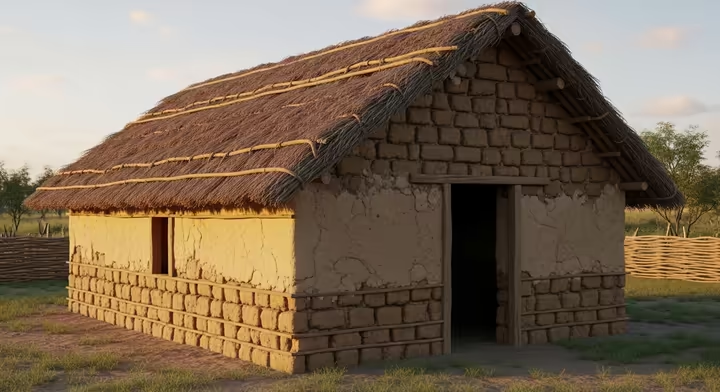
Life on the Lake
If you lived in the capital, Tenochtitlan, you might be on a chinampa , a man-made island built on the lake. For that, you'd need a lighter house, called a chinancalli .
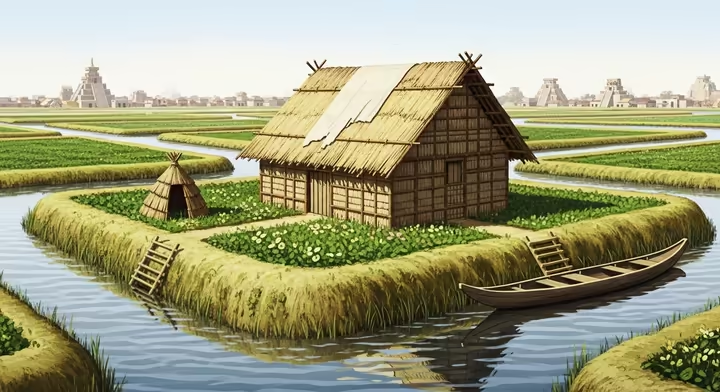
These were made with a wattle-and-daub technique. A wooden frame was interwoven with reeds, then slathered in a thick layer of mud. Lightweight and perfect for living on the water.
Layout and Looks
Your average house was plain and simple. One main room, a rectangle with an open doorway (no door, maybe just a cloth hanging there). No windows, no chimney... cozy, right?
To keep things bright, the outside walls were often whitewashed with lime plaster. This also helped reflect the sun and keep the inside cool.
But you didn't live alone. Several families, usually related, would live in houses arranged around a shared central patio. This courtyard was the real living room, where women ground maize, people worked, and everyone socialized.
The Noble's Palace
If you were a noble, or pilli , your house was a different story. These residences, called a tecpan , were designed to show off your power and wealth.
Fancier Materials
No mud bricks for you. Nobles built with finely cut stone like tezontle , a cool reddish volcanic rock. The walls were then covered in high-quality lime plaster that made them gleam white in the sun.
The insides featured sweet-smelling cedar and pine wood for beams and doors.
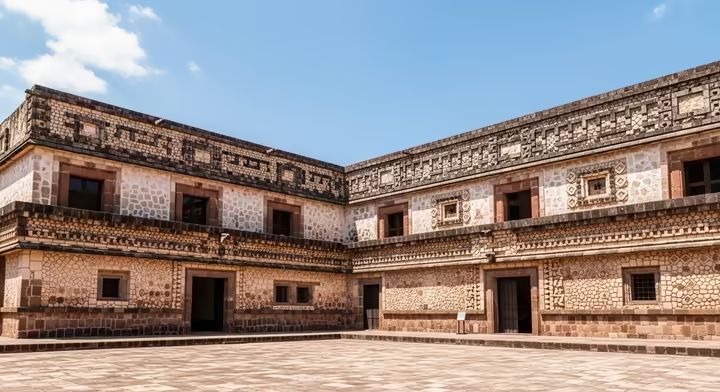
Showing Off
Here's the real status symbol, only nobles were legally allowed to build a second story. It was a simple way to make sure their homes physically towered over everyone else's.
The outside walls were decorated with elaborate stone carvings and the inside walls were covered with colorful murals of myths, battles, or court life.
A Peek Inside a Tecpan
A noble's palace, a tecpan , was a home, office, bank, and stage all rolled into one. The layout carefully separated public spaces from private ones. You'd enter into large courtyards where the lord would hold court and receive visitors.
The deepest parts of the palace were a maze of passages and smaller patios. This was the private area for the family, with living quarters, storerooms, and beautiful gardens.
One Spanish soldier, Bernal Díaz del Castillo, was blown away by Moctezuma's palace. He wrote about huge halls, shiny walls, lush gardens with pools, and even private aviaries and a zoo with jaguars!
What Was Inside?
Stepping inside an Aztec calli meant entering a space that was both practical and sacred.
Furniture (or lack thereof)
Furniture was minimal. The most important item was the petlatl , a woven reed mat. It was your chair during the day and your bed at night.
Other than that, you might have a low wooden stool, called an icpalli , and wooden chests or baskets to store your belongings.
The Sacred Hearth
The heart of the home was the hearth, made of three stones arranged in a triangle. This was more than a stove, it was a sacred altar to the fire god, Huehueteotl-Xiuhtecuhtli. The fire was seen as a divine presence.
Around the hearth was the women's domain. Here you'd find a metlatl , a stone for grinding maize, and a comalli , a clay griddle for cooking tortillas. The rhythmic sound of grinding was the sound of an Aztec home.
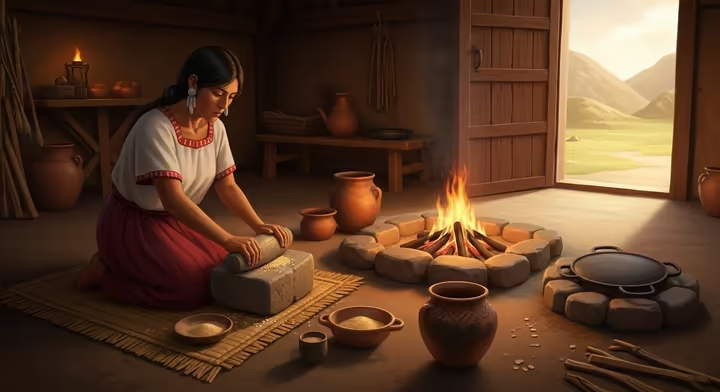
Most homes also had a small family altar. Here they kept clay figures of household gods and left daily offerings of food and incense.
The Sweat Bath
The Aztecs were big on cleanliness. Many homes had a temazcal , or sweat bath. It looked like a small, low dome made of adobe or stone.
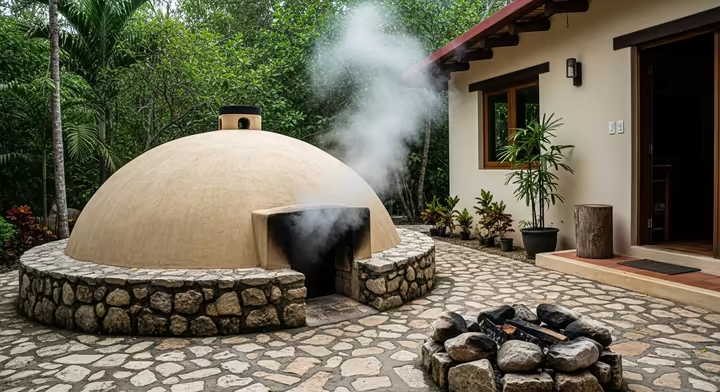
You'd heat rocks in a fire, bring them inside the temazcal , and pour water on them to create steam. It was part spa, part spiritual cleanse, a way to purify both body and soul.
So... How Do We Know All This?
Good question. No one left us a perfect blueprint. We piece the story together from three main clues...
Archaeology. Archaeologists dig up the physical proof. They find stone foundations, bits of plaster, and the trash people left behind (which tells you a lot!). This gives us the ground-level view of how these houses were built and what people did in them.
Codices. The Aztecs and their descendants created amazing illustrated books called codices. Manuscripts like the Florentine Codex are like encyclopedias of Aztec life, full of drawings of houses and daily routines. (Though they were often made under Spanish supervision, so we have to keep that in mind).
Spanish Accounts. The Spanish conquerors wrote a lot about what they saw. Soldiers like Bernal Díaz del Castillo described the amazing palaces in Tenochtitlan. Of course, they were outsiders looking in, but their accounts are still a useful piece of the puzzle.
Putting all these clues together gives us a pretty good picture of the Aztec home. It's a puzzle that's still being solved.
Works cited
- Aztec Homes Style, https://aztec-homes-style.s3.us.cloud-object-storage.appdomain.cloud/index.html
- Aztec Housing from Grand to Primitive - History on the Net, https://www.historyonthenet.com/aztec-housing-from-grand-to-primitive
- AZTEC ARCHITECTURE - FAMSI, http://www.famsi.org/research/aguilar/Aztec_Architecture.pdf
- AZTEC ARCHITECTURE -Part 1 - FAMSI, http://www.famsi.org/research/aguilar/Aztec_Architecture_Part1.pdf
- calli. - Nahuatl Dictionary, https://nahuatl.wired-humanities.org/content/calli
- www.azteccalendar.com, https://www.azteccalendar.com/day/Calli.html#:~:text=Day%20Calli%20(House%2C%20known%20as,rest%2C%20tranquility%20and%20family%20life.
- The Year of Ce Calli in the Aztec Calendar. - Spanglish Spoon, https://spanglishspoon.com/the-year-of-ce-calli-in-the-aztec-calendar/
- chantli. - Nahuatl Dictionary - Wired Humanities Projects, https://nahuatl.wired-humanities.org/content/chantli
- Aztec society - Wikipedia, https://en.wikipedia.org/wiki/Aztec_society
- calpolli. - Nahuatl Dictionary, https://nahuatl.wired-humanities.org/content/calpolli
- Aztec architecture - Wikipedia, https://en.wikipedia.org/wiki/Aztec_architecture
- en.wikipedia.org, https://en.wikipedia.org/wiki/Macehualtin
- Aztec Houses: A Peek Into the Daily Life of the Mexica - East India Blogging Co., https://eastindiabloggingco.com/2023/01/20/aztec-houses/
- ABCs of Making Adobe Bricks | New Mexico State University - BE BOLD. Shape the Future., https://pubs.nmsu.edu/_g/G521/index.html
- Aztec Houses - Aztec History, https://www.aztec-history.com/aztec-houses.html
- Aztec Architecture in Depth, https://thearchitecturalarchives.wordpress.com/2018/09/23/aztec-architecture-in-depth/
- Common House Construction Of Houses In The Aztecs - 275 Words - Bartleby.com, https://www.bartleby.com/essay/Common-House-Construction-Of-Houses-In-The-FCWJSDZFWT
- Home smoky home! - Mexicolore, https://www.mexicolore.co.uk/aztecs/aztec-life/home-smoky-home
- Chinampa - Wikipedia, https://en.wikipedia.org/wiki/Chinampa
- chinancalli. - Nahuatl Dictionary, https://nahuatl.wired-humanities.org/content/chinancalli
- Welcome to the Online Nahuatl Dictionary! | Nahuatl Dictionary, https://nahuatl.wired-humanities.org/
- Wattle and daub - Wikipedia, https://en.wikipedia.org/wiki/Wattle_and_daub
- Architecture - The Aztec Empire, http://aztecflaim.weebly.com/architecture.html
- What do Aztec and Mayan houses and commercial buildings look like? We always hear of their large cities, why do we only see pyramids? : r/AskHistorians - Reddit, https://www.reddit.com/r/AskHistorians/comments/603mp1/what_do_aztec_and_mayan_houses_and_commercial/
- Households and daily life in Mesoamerica - Mexicolore, https://www.mexicolore.co.uk/aztecs/home/households-and-daily-life-in-mesoamerica
- Pipiltin - Wikipedia, https://en.wikipedia.org/wiki/Pipiltin
- Pilli | Aztec social class | Britannica, https://www.britannica.com/topic/pilli
- tecpan. - Nahuatl Dictionary, https://nahuatl.wired-humanities.org/content/tecpan
- The Aztec Palace under Spanish Rule Disk Motifs in the Mapa de México de 1550 (Uppsala Map or Mapa de Santa Cruz) - Anthropology, https://anth.la.psu.edu/wp-content/uploads/sites/3/2022/06/Evans_AztecPalaceUnderSpanishRule.pdf
- Aztec lime plaster - Mexicolore, https://www.mexicolore.co.uk/aztecs/aztefacts/lime-plaster
- Aztec Architecture — MayaIncaAztec.com, https://www.mayaincaaztec.com/aztec/aztecarchitecture
- Moctezuma's Palace in Tenochtitlan, Mexico ~ 1510 CE : r/papertowns - Reddit, https://www.reddit.com/r/papertowns/comments/ax3v6s/moctezumas_palace_in_tenochtitlan_mexico_1510_ce/
- Ancient palace complex (300–100 BC) discovered in the Valley of ..., https://www.pnas.org/doi/10.1073/pnas.1701336114
- Codex Mendoza - Wikipedia, https://en.wikipedia.org/wiki/Codex_Mendoza
- Файл:Codex Mendoza folio 69r.jpg - Вікіпедыя, https://be.wikipedia.org/wiki/%D0%A4%D0%B0%D0%B9%D0%BB:Codex_Mendoza_folio_69r.jpg
- "The True History of the Conquest of New Spain", https://chnm.gmu.edu/worldhistorysources/sources/conquestofnewspain.html
- The Project Gutenberg eBook of the memoirs of the conquistador ..., https://www.gutenberg.org/files/32474/32474-h/32474-h.htm
- Petate - Wikipedia, https://en.wikipedia.org/wiki/Petate
- A people's bed - Mexicolore, https://www.mexicolore.co.uk/aztecs/aztefacts/peoples-bed
- Aztec Religion and Rituals | History Cooperative, https://historycooperative.org/aztec-religion-rituals-sacrifices/
- Metate - Wikipedia, https://en.wikipedia.org/wiki/Metate
- How to use a metate - Mission Chocolate Recipes, https://missionchocolaterecipes.com/how-to-use-a-metate/
- Comal (cookware) - Wikipedia, https://en.wikipedia.org/wiki/Comal_(cookware)
- The Mexican Comal: Traditional Aztec Griddles - Ancient Cookware, https://ancientcookware.com/blog/the-mexican-comal-traditional-aztec-griddles-1
- Aztec Architecture and Ritual | By Daisy Trejo and Renee Sim, https://daisyrenee.wordpress.com/
- Gods and Rituals | The Guggenheim Museums and Foundation, https://www.guggenheim.org/teaching-materials/the-aztec-empire/gods-and-rituals
- Offerings to Quetzalcoatl , Tlaloc, Mictlantecuhtli : r/Anahuac - Reddit, https://www.reddit.com/r/Anahuac/comments/q6wwzr/offerings_to_quetzalcoatl_tlaloc_mictlantecuhtli/
- Aztec homes - Aztec History, https://www.aztec-history.com/aztec-homes.html
- Temazcal: Traditional Mexican Sweat Lodge - TripSavvy, https://www.tripsavvy.com/temazcal-traditional-mexican-sweat-lodge-1588898
- Steam Bath in an Igloo! - Mexicolore, https://www.mexicolore.co.uk/aztecs/aztec-life/steam-bath-in-an-igloo
- The Healing and Beautifying Practice of Ancient Temezcal - Around The World Beauty, https://www.aroundtheworldbeauty.com/journey-mexico-purification-ancient-temezcal/
- Can you describe the experience of being a woman living among the Aztecs? - Quora, https://www.quora.com/Can-you-describe-the-experience-of-being-a-woman-living-among-the-Aztecs
- The Many Roles of Aztec Women in Society - East India Blogging Co., https://eastindiabloggingco.com/2024/04/05/aztec-women/
- Short Teaching Module: Codex Mendoza (16th c.) | World History ..., https://worldhistorycommons.org/short-teaching-module-codex-mendoza-16th-c
- Roles of Men and Women in the Aztec Empire - HISTORY CRUNCH, https://www.historycrunch.com/roles-of-men-and-women-in-the-aztec-empire.html
- Tlatelolco (archaeological site) - Wikipedia, https://en.wikipedia.org/wiki/Tlatelolco_(archaeological_site)
- Pre-Hispanic city of Calixtlahuaca's story didn't end with the conquest, https://mexiconewsdaily.com/mexico-living/calixtlahuacas-story-didnt-end-with-conquest/
- Aztec period houses and terraces at Calixtlahuaca: The changing morphology of a Mesoamerican hilltop urban center - CiteSeerX, https://citeseerx.ist.psu.edu/document?repid=rep1&type=pdf&doi=c06127bb68ef8b4bb4757bf08adefec6e0841540
- Aztec Archaeological Sites in Mexico with Dr Michael Smith - YouTube, https://www.youtube.com/watch?v=pL3NWsnzrBw
- Wealth Stratification in Ancient Mesoamerica - Social studies, https://www.sociostudies.org/journal/articles/143122/
- At Home with the Aztecs: An Archaeologist Uncovers Their Daily Life - Google Books, https://books.google.com/books/about/At_Home_with_the_Aztecs.html?id=4XHQsgEACAAJ
- At Home with the Aztecs: An Archaeologist Uncovers Their Daily Life - Barnes & Noble, https://www.barnesandnoble.com/w/at-home-with-the-aztecs-michael-smith/1126172750
- At Home with the Aztecs: An Archaeologist Uncovers Their Daily Life -, https://www.routledge.com/At-Home-with-the-Aztecs-An-Archaeologist-Uncovers-Their-Daily-Life/Smith/p/book/9781138100749
- Digital Florentine Codex, https://florentinecodex.getty.edu/
- Two Aztec houses: upper, adobe house with thatch roof; lower, poor farmer - Digital Collections | AMNH - Homes, https://digitalcollections.amnh.org/archive/Homes--Two-Aztec-houses--upper--adobe-house-with-thatch-roof--lower--poor-farmer--2URM1T14NLX1.html
- Florentine Codex - Wikipedia, https://en.wikipedia.org/wiki/Florentine_Codex
- Codex Mendoza (1542) - The Public Domain Review, https://publicdomainreview.org/collection/codex-mendoza-1542/
- The Essential Codex Mendoza, https://www.csus.edu/indiv/o/obriene/art111/readings/The%20Essential%20Codex%20Mendoza.pdf
- Travel Narratives - Roy Rosenzweig Center for History and New Media, https://chnm.gmu.edu/worldhistorysources/unpacking/travelanalysis.html
- Bernardino de Sahagún - Wikipedia, https://en.wikipedia.org/wiki/Bernardino_de_Sahag%C3%BAn
- General History of the Things of New Spain by Fray Bernardino de Sahagún: The Florentine Codex. | Library of Congress, https://www.loc.gov/item/2021667837/